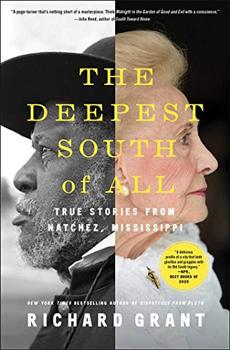Summary | Excerpt | Reviews | Beyond the Book | Readalikes | Genres & Themes | Author Bio

True Stories from Natchez, Mississippi
by Richard GrantChapter 1
I first heard about Natchez from a chef and cookbook writer named Regina Charboneau. I met her on the opening night of the Hot Tamale literary-culinary festival, which took place in a repurposed cotton gin surrounded by bare fields in the Mississippi Delta. The hulking old tin structure was hung with chandeliers and furnished with banqueting tables. Wineglasses and silverware glinted on white tablecloths. There were artisanal charcuterie stations, hundreds of well-dressed people milling around, a small army of bartenders pouring free wine and liquor.
Regina and I were both signing copies of our latest books at the author tables. I had written a true account of moving to rural Mississippi as an Englishman chewed up by New York City. Regina had published a handsome cookbook about the local cuisines along the length of the Mississippi River. She was warmhearted, witty and cosmopolitan, with a natural air of authority. She wore vintage cat-eye glasses and her dark hair in a bob. For many years she had owned a fashionable restaurant and a blues club in San Francisco, and her friends included Lily Tomlin and the Rolling Stones.
Now she had sold everything in San Francisco and moved back to her hometown of Natchez, Mississippi, where her family has lived for seven generations. I confessed that I knew nothing about Natchez, although I recognized its name, which rhymes with matches, from an old Howlin' Wolf song. "Natchez is wonderful," she said. "We're known for our history and our antebellum homes, and we're very different from the rest of Mississippi. People often describe Natchez as a little New Orleans, but it's really off in its own universe."
Her husband Doug, a native Minnesotan—they met in Alaska while Regina was cooking at a bush camp—poured me a shot of the white rum he was distilling in Natchez. It tasted raw and alive and faintly of tequila. They showed me photographs of their house, an antebellum Greek Revival home named Twin Oaks with white columns and Gothic-looking trees. "You must come and stay with us," said Regina. "I'll cook, and there's always a party, and you can do a book signing at King's Tavern." This was her latest restaurant, housed in one of the oldest standing buildings in Mississippi, circa 1789.
This was an impossible invitation to refuse, and soon afterwards I drove to Natchez for the first time. The town is tucked away in a remote corner of southwest Mississippi, on a bluff overlooking the Mississippi River. The nearest airport is ninety miles away in Baton Rouge, Louisiana, and there's no passenger train or interstate-highway connection. To get to Natchez, you've got to be going there, as Mississippians often say, because it's not on the way to anywhere else.
Country roads took me through a gently undulating landscape of woods and pastures, with occasional shacks and farmhouses and small fundamentalist churches. Scrolling through the radio, there was a babble of preachers, white and African American. I passed a derelict gas station with a forlorn sign:
PUMPING TO PLEASE
SOUL FOOD
Soon afterwards I entered the scruffy, unremarkable outskirts of Natchez. It was the usual Southern strip of fast-food joints and tractor-supply shops, easy loans, dollar stores, gas stations, and churches. There was a Mexican restaurant, a basic-looking supermarket, a swooping overpass leading to the Walmart.
The road to King's Tavern took me through an African American neighborhood that looked poor and tired. I pulled over to read a historical marker and a chill went through me. I was standing on the site of the second-largest slave market in the Deep South, a place known as the Forks of the Road. I could see a small memorial on a side street, and I walked over to take a look.
There were a few illustrated panels and a set of manacles mounted in a concrete block. The panels were thoughtful, informative, and deeply unsettling, with reproduced historical drawings of slaves, slave traders, and newspaper advertisements for the human commodity: "Negroes! Negroes! Just received, an addition of TWENTY-FIVE likely young field hands—Also, a fine Carriage Driver and Dining Room servants, for sale by R.H. ELAM, Forks of the Road."
Excerpted from The Deepest South of All by Richard Grant. Copyright © 2020 by Richard Grant. Excerpted by permission of Simon & Schuster. All rights reserved. No part of this excerpt may be reproduced or reprinted without permission in writing from the publisher.
We should have a great fewer disputes in the world if words were taken for what they are
Click Here to find out who said this, as well as discovering other famous literary quotes!
Your guide toexceptional books
BookBrowse seeks out and recommends the best in contemporary fiction and nonfiction—books that not only engage and entertain but also deepen our understanding of ourselves and the world around us.